- Home
- Tony Hillerman
The Shape Shifter jlajc-18 Page 18
The Shape Shifter jlajc-18 Read online
Page 18
Delos had put one of these very special cherries on the top of the slice. Hour or so later on the way home Mr. Bork died of poisoning.”
“Oh,” Delonie said.
“Then I came along to find out what had happened to Bork. I asked Mr. Delos a lot of questions about that rug, how he came to have it, so forth. He had Mr. Vang make me a little lunch, too. Put a slice of fruitcake in it, put one of these cherries on top.”
“I didn’t,” Tommy said. “Mr. Delos did that always.
Used them as decorations. Just for somebody special, he would say. And put it on top. I didn’t know he was punching those holes in them.”
“Why didn’t it poison you?” Delonie asked.
“I don’t like fruitcake and I didn’t get around to stealing the cherry off the top, and finally Vang here heard what had happened to Mr. Bork. It made him nervous. So he found me and tried to take the lunch back.” Delonie rolled two more cherries out of the bottle, looked at them, then looked out the sliding glass door, considering the activity among the birds.
“About this time of day, we usually have a bunch of crows showing up. If I’m not home, they crowd out the smaller birds and pig out on the bird food. Not just eat THE SHAPE SHIFTER
215
it, they scatter it all around. I run ’em off. Used to have a shotgun I could thin them out with, but the probation officer wouldn’t let me keep that.”
“You thinking about poisoning them?” Leaphorn asked.
“Crows will eat just about anything. They’d gobble these up. If they really are poison, that would be fewer crows around to steal the eggs out of other birds’ nests.
Looks like a way to show whether you’re telling the truth.”
And so Delonie put the cherries back into the jar, slid open the glass door, and walked out into the patio. Some of the bigger birds fled, but Leaphorn noticed that most of the smaller ones seemed to recognize him as harmless.
He placed four of the cherries in a line atop the wall, and one on each of the roofs of four of the bird feeders, came back through the door, turned to survey his handiwork, then hurried back out again. He retrieved the cherries from the feeder roof, put them back into the bottle, came in, and slid the door shut, and stood far enough inside to be invisible to the birds, watching.
“In case you wondered why I wanted those cherries back,” he said. “While them cherries would be way too big for the wrens, and finches, and the little ones to handle, putting them right on the feeders might tempt the doves, or the bigger ones. Them birds have to deal with all sorts of predators. Hawks, crows, snakes, rats, stray cats. Killing a few crows just does my birds a favor, but I didn’t want to kill any of the good ones.”
Leaphorn looked at his watch. “How long would you guess we’ll be waiting to see if this works?” Delonie laughed. “Not long,” he said. “Crows are 216
TONY HILLERMAN
smart. They watch. In fact, there was a little flock of the local crows up in the trees back there watching when I came out. They’re not here all the time because they know I have those feeders rigged so they can’t get their big heads into most of them. But when they see me come out carrying something that looks like it might be food, they start flying in a hurry. They want to beat the little birds to it.”
Even as Delonie was saying that, two crows arrived, landing in a pinyon just beyond the wall. Three others followed. One noticed the cherries, landed on the wall.
Picked up a cherry, found it a little too large to swallow, and flew back into the pinyon with it. Minutes passed. The sight of the cherries attracted another crow to the wall. It speared a cherry and stayed on the wall and worked away at getting it torn up enough to swallow. Then he pecked another one, knocked it off the wall, and flew down into the patio to find it. A third crow grabbed the remaining cherry, held it in his beak briefly. Put it back on the wall, pecked at it. It fell into the grass below, and the crow flew down looking for it.
Leaphorn checked the time. How long had it taken the poison to kill Bork? No way of knowing, but it had apparently acted to affect his driving within a relatively few minutes. Bork weighed maybe two hundred pounds.
A crow would be a matter of ounces. Did a crow have a craw, as chickens did, in which foods were ground before being dumped into the stomach? Leaphorn didn’t know.
But while he was pondering that, Tommy Vang touched his shoulder.
“Look,” he said, pointing.
The crow that had carried its prize into the pinyon THE SHAPE SHIFTER
217
was moving its wings. It seemed to fall from one branch to a lower one, recover itself, flap its wings, and begin a sort of frantic flight. A very short flight. Abruptly its effort stopped, and it dropped behind the wall.
“Poisoned, I guess,” said Tommy Vang. “I guess you were right about those little puncture holes.” Delonie was standing beside them now, watching.
“That one on the ground there, too,” he said. “Look at that.”
The crow was on the grass, trying to stand, trying to get its wings moving. Dying.
“I guess that would have been me,” Delonie said. “I guess I owe you gentlemen a thank-you or something.”
“What we need from you,” Leaphorn said, “is to tag along with us to visit Mr. Delos, make sure he is the man you remember as Ray Shewnack so we can get him arrested and indicted and get him put away.” But even as he said it, Leaphorn was thinking he’d need a lot of luck to make any of those things happen.
“Where we going to get me a chance to look at him?” Delonie asked. “That means driving to Flagstaff, I guess.”
“Mr. Vang is going to help us with that,” Leaphorn said. “Mr. Delos left home to go hunting. Hunting elk. He was going after a big trophy bull elk up on one of those hunters’ ranch places along the Colorado-New Mexico border. Vang’s supposed to drive up there tomorrow and give him a bunch of information about you. About where you live, alone or what, where you work, your habits, what your vehicle looked like. Stuff like that.” Delonie was studying Vang while receiving this information. “Supposed to get acquainted, sort of, or just snoop around?”
218
TONY HILLERMAN
“He said better if you didn’t see me,” Vang said. “I was supposed to just find out when you weren’t home and leave those cherries in your mailbox, or by your front door, and then go away.”
Delonie considered this. “That son of a bitch,” he said.
“He sure had me all figured out, didn’t he? He figured I’d be eating those cherries while I sat there wondering who the hell had sent them. He was right, too. I wouldn’t have had the brains to stop and think about it.” Leaphorn shrugged. “Why would you? You didn’t have any reason to be suspecting anything. You knew Shewnack was dead. Formally certified by the Federal Bureau of Identification.”
Delonie nodded. “Now let’s figure out how we’re going to nail him. If we want to catch him out hunting, we’ll need to get there early. That’s when the elk and the deer are coming out of the cover to get themselves a wake-up drink of water. And that’s when those hunting-camp-type hunters are all set up waiting for them. We need to start getting ourselves ready for this. It’s a long drive up there.”
18
Getting ready for the venture first involved cleaning off enough of the table so that Tommy Vang could spread out his old road map, let them inspect the marks Delos had drawn on it, and expose the notes of instruction he had written for Tommy. They sat in the three straight-backed chairs, with Delonie in the middle.
Delonie tapped the area Delos had circled.
“That’s where he’s doing his hunting? Is that it?” he asked. “If it is, then our best bet would be to drive over to Cuba on 550.” He paused, shook his head. “But there we got a choice. Either the long way on pavement on 537
through the Jicarilla Apache Reservation, or take the short way. Just keep going north out of Cuba to La Jara on old Highway 112 straight up to Dulce. Both get you to t
he same place. The first way is a lot longer, but it’s all paved road. That county road 112 gets you going over a lot of dirt.”
220
TONY HILLERMAN
Leaphorn was trying to remember the shorter route.
Terrible when snow was melting, but probably not bad this time of year. While he was pondering this, Delonie muttered something negative about the old Delos map, got up, disappeared into what was probably a bedroom, and emerged with other maps. One was a bound volume of reproductions of U.S. Geological Survey section surveys, another was an oil field pipeline route map that Leaphorn didn’t recognize, and the third was a copy of the AAA Indian Country map like the one Leaphorn used himself. Delonie put them all on the table, pushed aside the USGA volume and the pipeline maps, and folded the Indian Country version to expose the pertinent portion of the Colorado-New Mexico border. On it, he carefully pencil-sketched the circle from Delos’s map. Checked his work with the Delos map, made some slight corrections, and stared at the Delos notes.
“Can you read this scribbling here,” he asked Tommy Vang.
Vang leaned over the map, looking surprised. He picked up the pencil Delonie had dropped on the map.
“Sure,” he said, and tapped a scribble with the pencil tip. “Right here he says ‘Wash cuts across road here. Park in wash. Wait in car. I come.’ And this right here that sort of looks like a big M. Those lines beside it is ‘Lazy W.’” Vang laughed. “I think lazy because it’s not an M but a W
laying on its back.”
“It’s probably the rancher’s cattle brand,” Delonie said, studying Vang, frowning. “How long you been working for this man? Brought you over from Asia when you were a boy, did he? That would have been close to thirty years ago. Did you already know English then?” THE SHAPE SHIFTER
221
Vang laughed. “I was just nine or ten, I think. Just talked Hmong, and a little bit of Vietnamese, and some words of Chinese. But I studied English on the television in San Francisco. On the programs they had for children.” Vang laughed. “Funny stuff. Clowns and puppets and little things supposed to be like animals. But it taught you numbers and if you paid attention you could get the meaning of the words they were saying.”
“Never went to any regular school then,” Delonie said, sounding incredulous.
“But you learn a lot on television. Like you watch Law and Order, and NYPD Blue, and those other ones, and you learn a lot about how policemen like Mr. Leaphorn here do their work. And you learn about different kind of guns.
The only ones we had when I was a boy were the rifles the Americans brought for us, and some my uncles had taken from the Vietcong and the Pathet Lao.” Delonie considered that, now looking grim. “Are you telling me that miserable bastard never put you into any regular school? You never did really have anybody teaching you anything?”
“Oh, no,” Vang said, looking shocked. “Mr. Delos put me in a cooking school. I helped in the kitchen and the people there taught me how to make bread, and cookies, and soups, and . . . well just about everything.”
“But nobody taught you how to read. Or write, or anything like that?”
“Well, not sit behind a desk in a regular classroom like I see they do on television. Not anything like that.
But I learned all sorts of other things. Mr. Delos and the woman who ran the food place where I was learning how to cook, they got me into a dry cleaner’s place. Where 222
TONY HILLERMAN
they work on making clothing fit better.” Thinking of that caused Vang to smile.
“I learned how to mend, and patch, and iron, and do what they called ‘destaining.’ I was very good at that.” Delonie was looking somber. “Never did send you to a regular sort of school then,” he said. “Just kept you home and you worked for him. Did his cooking, and was sort of like a housekeeper.” He glanced at Leaphorn. “I guess that’s about what you were telling me, wasn’t it. But I wasn’t taking it seriously.”
“Well, that’s the way it was,” Leaphorn said. “Mr. Vang was Mr. Delos’s cook, housekeeper, and sort of secretary, too. Arranged his trips. Things like that.”
“Worked for the bastard about twenty-five years or so, then, I’d estimate. What kind of wages did he pay you?”
“Wages?” Vang asked. “Nothing much when I was just a boy, I guess, but later on when I went out to do the shopping for things, Mr. Delos told me to just use the charge for stuff I needed.”
“For stuff you needed,” Delonie said. “Like what?” Vang shrugged. “Like socks and underwear, and when I got older, razor blades, and that deodorant for under your arms. Sometimes I would buy chewing gum, or candy bars, things like that. Mr. Delos didn’t seem to mind.”
Delonie recovered the pencil and began jotting figures on the corner of the map.
“I’m figuring minimum wage at an average of $5 an hour in California ’cause it goes up and down. Higher now. Lower then. Figure him a forty-hour, five-day week, even though he was working full time and seven days, just figure it at forty. That would be two hundred bucks a THE SHAPE SHIFTER
223
week. Now maybe we should cut that in half because he got room and board. Make it a hundred per week. That fair?”
Without waiting for Vang or Leaphorn to answer, Delonie was doing the math.
“I’m calling it twenty years—knocking off those years before Vang was in his late teens. Then knocking two weeks off each year for vacation time, even though Vang didn’t get any vacation. That gives us an even thousand weeks. Right? Multiply that by a hundred dollars a week, and it comes out Delos owes Vang a hundred thousand dollars. Right? Now if we figure in some interest, compounded annually, then it means that Mr. Delos—” Leaphorn, who almost never interrupted anyone, interrupted. “Mr. Delonie,” he said. “We see your point. But don’t you think we should be sort of changing the subject and getting back to what we’ve got to do tomorrow?” Delonie stared at Leaphorn. Put down the pencil.
Picked it up again.
“All right. I guess so. I can’t get it in my mind though, that this Delos is really going to be Ray Shewnack. If I see him, and it really is Shewnack, what I think I’m going to do is just shoot him.”
“You do that, you’ll be right back in prison again,” Leaphorn said. “And not just for parole violation.” Delonie nodded. “I know. But it would damn sure be worth it.”
“Trouble is, I’d be going in there with you. Me and Tommy Vang here.”
“You think you can go up there, catch him, take him in, and get him convicted of anything? Damned if I see how. Me, a convicted felon, as your only witness.” 224
TONY HILLERMAN
“Let the jury decide,” Leaphorn said. “Anyway, you can’t cook the rabbit until you catch it.” Delonie made a wry face, bent over the map again.
“Well,” he said. “If Delos wants to meet Mr. Vang right here where he marked that spot, it must mean he’d have his hunting stand pretty close. I guess we can drive up there, though. He must know that area pretty well.”
“Mr. Delos has been there before,” Tommy Vang said. “He took me once, when I was a lot younger.” He smiled at the thought. “I got to learn how to cook on the woodstove. Mostly just frying meat and boiling stuff and mixing drinks for people. But the cooking wasn’t easy until you know how to control the heat. Be way too hot, or then too cold.” He shrugged. “The way my mother had to do it.”
“Has a kitchen then,” Delonie said. “I guess they have a cabin up there handy for those permit hunters to keep dry and comfortable.”
“A little log house,” Tommy said. “Mostly just one big room and a little kitchen place and then there was a water tank on the roof. You turned a big valve and the water came down in a sink in the kitchen.” His expression registered disapproval. “It didn’t look very clean. Everything dirty. The water, too, I mean. Sort of rusty looking.”
“You were a mountain boy, weren’t you?” Delonie said. “Maybe that sort of reminded you of home. Log
cabin, wood fire, and all.”
“It did,” Vang said, and looked down. “But we weren’t dirty like that.”
Delonie was staring at him, expression grim. “That son of a bitch,” he said. “He should have taken you home again.”
THE SHAPE SHIFTER
225
“He said he would,” Vang said. “Said he was going to do that.”
“Do you still believe that?” Delonie asked.
Vang considered. “I used to believe it. For a long time I believed it,” he said. Then he bent over the map, either studying it or, Leaphorn guessed, not wanting them to see that he was about to cry.
“Right here,” Vang said, tapping an ink dot beside a line which, in the map marking code, identified a road as
“doubtful” and to be avoided in bad weather.
“I guess that’s where we’re going,” Leaphorn said.
“Shouldn’t be any problem this time of year.”
“I think that’s going to be on the old T.J.D. Cater spread,” Delonie said. “I hunted up fairly near to there when I was a lot younger. The old man owned a lot of his own land and then his grazing permit spread out over a bunch of National Forest leases. Went way up into the mountains, I remember. It was all posted. No trespassing. Had a deal with the Game Department people to let the deer and elk graze on his leased grass and drink his water. Then they’d give him a bundle of hunting permits he could sell.”
“But Mr. Delos said he’d be hunting on the Wither-spoon Ranch,” Vang said. “And that’s where he went last year. That mark he made right there, that little squiggle, he said that was a big sign by the road. It tells people that anybody who goes on the property without permission will be prosecuted. Big sign says Posted, and then there’s what Delos said they call ‘The Lazy W,’ painted on a board nailed to a tree.”

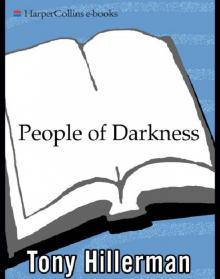 People of Darkness
People of Darkness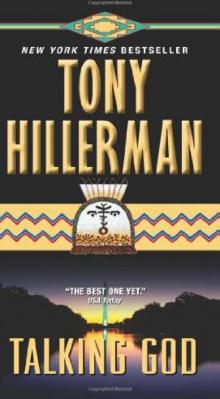 Talking God jlajc-9
Talking God jlajc-9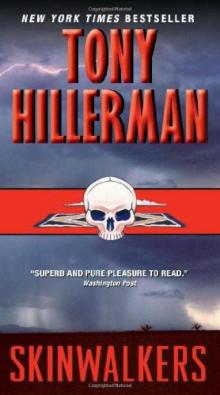 Skinwalkers jlajc-7
Skinwalkers jlajc-7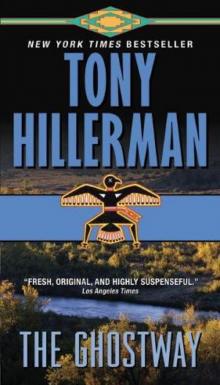 The Ghostway jlajc-6
The Ghostway jlajc-6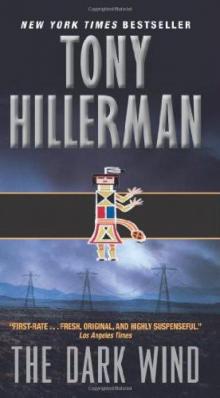 The Dark Wind jlajc-5
The Dark Wind jlajc-5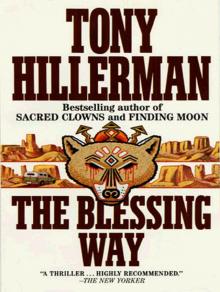 The Blessing Way
The Blessing Way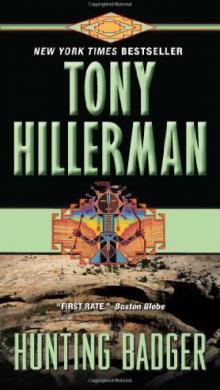 Hunting Badger jlajc-14
Hunting Badger jlajc-14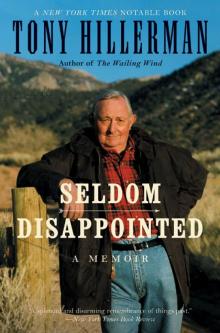 Seldom Disappointed: A Memoir
Seldom Disappointed: A Memoir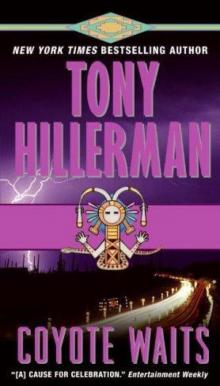 Coyote Waits jlajc-10
Coyote Waits jlajc-10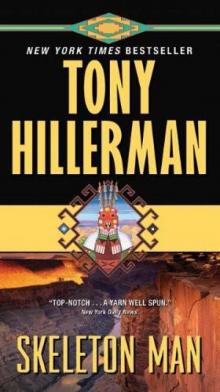 Skeleton Man jlajc-17
Skeleton Man jlajc-17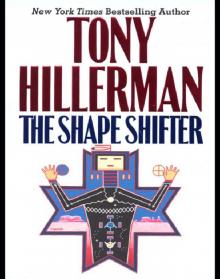 The Shape Shifter
The Shape Shifter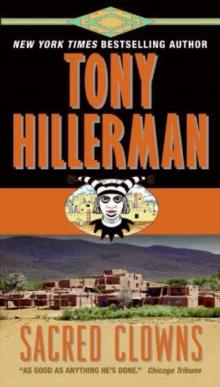 Sacred Clowns jlajc-11
Sacred Clowns jlajc-11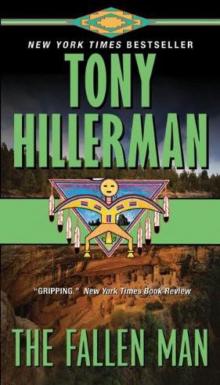 The Fallen Man jlajc-12
The Fallen Man jlajc-12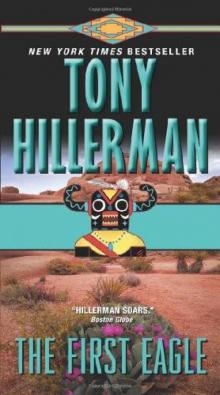 The First Eagle jlajc-13
The First Eagle jlajc-13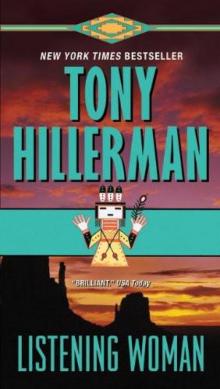 Listening Woman jlajc-3
Listening Woman jlajc-3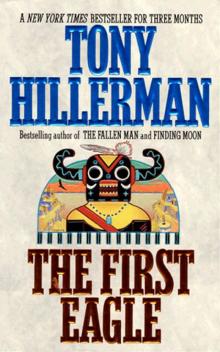 The First Eagle
The First Eagle Skeleton Man
Skeleton Man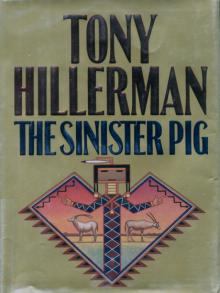 The Sinister Pig jlajc-16
The Sinister Pig jlajc-16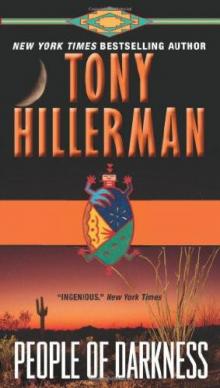 People of Darkness jlajc-4
People of Darkness jlajc-4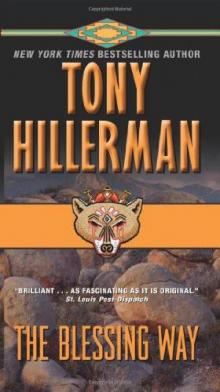 The Blessing Way jlajc-1
The Blessing Way jlajc-1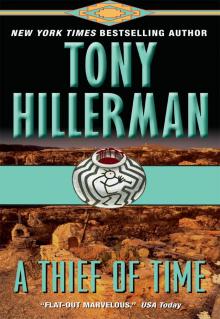 A Thief of Time
A Thief of Time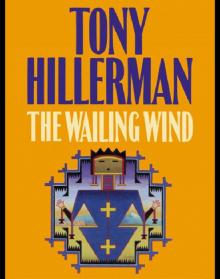 The Wailing Wind
The Wailing Wind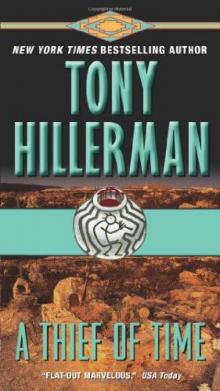 A Thief of Time jlajc-8
A Thief of Time jlajc-8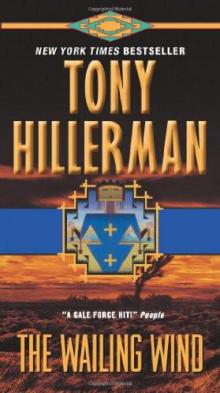 The Wailing Wind jlajc-15
The Wailing Wind jlajc-15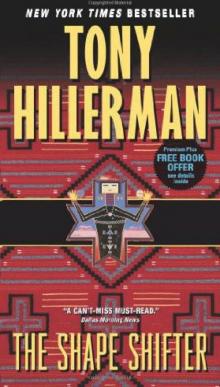 The Shape Shifter jlajc-18
The Shape Shifter jlajc-18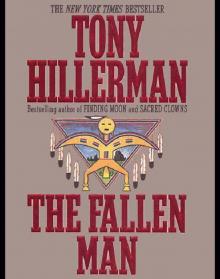 The Fallen Man
The Fallen Man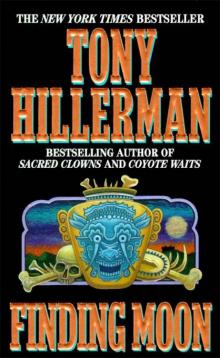 Finding Moon
Finding Moon